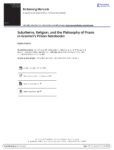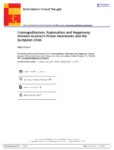The purpose of this essay is to reconstruct the relationship between subalterns, religion, and philosophy in Antonio Gramsci’s Prison Notebooks. With the birth of mass society—that is, with the entry onto the political scene of the popular masses, and above all of the peasantry—politics entered directly into relation with irrational passions bound up with the religious mentality, and hegemony was constructed not thanks to the institution of a “filter” for the passions (as was the parliament of “notables”) but through the mastering of those “passions” using forms of Caesarist and charismatic democracy. In Gramsci’s view, the political action of the subaltern classes had to confront this new form of hegemony by recognizing the value of the profound content of religious ideas (which always indicate the need for a unification of theory and practice) and by working on a “translation” of those ideas into the forms of self-organization and self-emancipation.
Fabio Frosini
Fabio Frosini is Associate Professor in the Department of Humanities at the University of Urbino (Italy). His research interests include Renaissance philosophy and culture, Marxist thought, and History of political philosophy.
Web site: https://uniurb.academia.edu/FabioFrosini
Posts by Fabio Frosini:
-
Subalterns Religion and the Philosophy of Praxis in Gramsci s Prison Notebooks
Posted at IGS Archive: 28 Nov 2019
Originally published in Rethinking Marxism | 2016 -
Qué es la crisis de hegemonía. Apuntes sobre historia, revolución y visibilidad en Gramsci
Posted at IGS Archive: 28 Nov 2019
Originally published in Las Torres de Lucca | 2017 -
HÉGÉMONIE : UNE APPROCHE GÉNÉTIQUE
Posted at IGS Archive: 28 Nov 2019
Originally published in Actuel Marx | 2015 -
Cosmopolitanism Nationalism and Hegemony. Antonio Gramsci’s Prison Notebooks and the European Crisis
Posted at IGS Archive: 25 Nov 2019
Originally published in International Critical Thought | 2017




